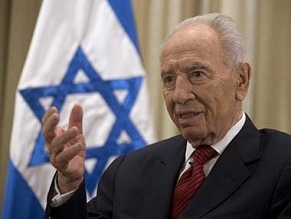|
World Jewish News

Israeli President Shimon Peres: “I expressed my opinion, and that was my duty. How influential was it? ‘Let another man praise thee, and not thine own mouth.''
|
Israel’s Peres reiterates to US media Israel cannot go it alone on Iran, as he insists he’s ‘not looking for confrontation’ with
10.01.2013, Israel and the World Israeli President Shimon Peres threatened to add fuel to the fire of reported tensions with Premier Benjamin Netanyahu as he reiterated his controversial Iran statements Wednesday, that “Israel cannot solve the problem alone”.
The comments made in an interview with The New York Times closely followed Peres’ public statement of support for Palestinian Authority (PA) President Mahmoud Abbas, which provoked retaliatory comment from Netanyahu’s ruling Likud coalition accusing the largely ceremonial statesman of undermining Israel’s international reputation.
However, when questioned on Israel’s policy regarding the Iranian threat, Peres insisted he was “not the spokesman” for Netanyahu or his government. “That’s not my job. I am not looking for confrontations with them,” he added, as he expressed his view that the US, whilst exploring all available diplomatic and non-military options in the first hand, “but in the end, if none of this works, then President Obama will use military power against Iran”.
His protestations come in direct contrast to the overriding conclusions of the Israel media, who, led by daily Ha’aretz, largely claimed the President’s remarks were an attempt to “use his prestige to propose a public alternative to Prime Minister Benjamin Netanyahu”. Peres’ opening inflammatory comments on Israel’s Iran policy last year, shortly after he received the Presidential Medal of Freedom from close ally and US counterpart Obama, prompted Netanyahu’’s office to retort that he has “forgotten what the president’s job is”.
Drawing a line under the controversy, however, Peres summarised of the incident: “I expressed my opinion, and that was my duty. How influential was it? ‘Let another man praise thee, and not thine own mouth,’ ” he said, quoting the Book of Proverbs.
Having said that, he immediately continued to appear to contradict himself, as he explained away Obama’s apparent suspicion of Israel’s desire for peace, by criticising the government for willingly alienating the US administration by pursuing its settlement expansion plans in spite of America’s calls for restraint. “We must not lose the support of the United States. What gives Israel bargaining power in the international arena is the support of the United States,” he concluded.
Despite his damning indictments of Israel’s current settlement policy, he refuted widespread consensus from within the international community that it has a damaging effect on the likelihood for peace. “The settlers have not eliminated the chance for the establishment of a Palestinian state. The settlements today cover 2 percent of the entire area,” he said, Appearing to criticise Netanyahu and his coalition government for refusing to consider making the necessary concessions, he concluded: “There are two things that cannot be made without closing your eyes — love and peace. If you try to make them with open eyes, you won’t get anywhere.”
Returning to his contentious public statements on Abbas, which followed Netanyahu’s own remarks to US Time magazine last year that “the Palestinians will never have a better partner than me” in peace negotiations, Peres insisted that Netanyahu respected his evaluations of the conditions for peace, despite the two Israelis’ disparate “evaluations of Abu Mazen (Abbas). I do not accept the assertion that Abu Mazen is not a good negotiating partner. To my mind, he is an excellent partner,” he added.
Moving on to discuss the recent Gaza escalation, Peres defied his reputation as a man of peace, attributed by many to his (rare within Israeli politics) lack of practical military experience, by insisting Israel’s Operation Pillar of Defence had been “an education lesson for Hamas”.
Elaborating on the lesson that “there’s no such thing as a cocktail of gunfire and peace”, he reiterated Israeli government rhetoric throughout the operation that the army had not sought to target civilians. “We have no desire to spill blood, not ours and not that of others. The operation was short, and the moment the lesson was conveyed and deterrence was established, it was stopped,” he summarised.
Further echoing Netanyahu’s position on the highly-topical issue of intra-Palestinian reconciliation between Gaza rulers and Hamas and their estranged rivals, the internationally-recognised Palestinian Authority in the West Bank, he said: “If Hamas accepts international demands, forsakes terror, stops firing missiles at us and recognizes the existence of the State of Israel, it will be possible to open negotiations.”
by: Shari Ryness
EJP
|
|
